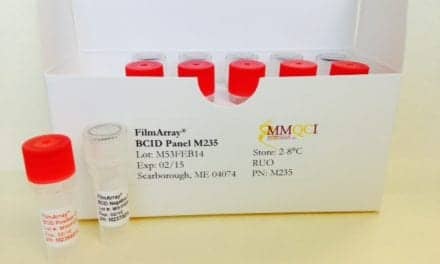EuroImmun AG, Lübeck, Germany, has developed the first system of comprehensive tests available for the serological detection and differentiation of Zika virus infections. The tests were granted the CE mark in February, making them eligible for sale in the European market. They are available in the United States under research use only labeling.
The EuroImmun anti-Zika virus tests, formatted as an enzyme-linked immunosorbent assay (ELISA) and an indirect immunofluorescence assay (IFA), allow for detection of specific antibodies (IgM and IgG) in the blood of those who may be infected. The tests provide a longer window for detection than the currently available quantitative polymerase chain reaction-based assays alone, making them particularly useful for disease surveillance. They can be used to diagnose patients with acute symptoms and to manage asymptomatic cases that fit a risk profile, particularly pregnant women.
The highly specific viral antigen used in the EuroImmun ELISA eliminates crossreactivity with other flavivirus antibodies, ensuring reliable differentiation from diseases such as dengue fever. The fully automated antibody detection test kits are suitable for rapid screening of large patient volumes and therefore provide efficient and effective monitoring of the virus spread.
“We have responded immediately to the growing concern of travelers and especially pregnant women around the world who have visited regions where the virus poses a potential risk,” says Katja Steinhagen, head of the ELISA infectious serology department at EuroImmun AG. “The ELISA and IFA tests have been evaluated in cooperation with the World Health Organization Collaborating Center for Arbovirus and Hemorrhagic Fever Reference and Research, in Hamburg, Germany. Positive test results are a clear indicator of a Zika virus infection; our unique immunofluorescence mosaics enable laboratories to effectively evaluate samples for other viral fever diseases in parallel.”
According to Hamid Erfanian, CEO of EuroImmun US, the company is prepared to address customer demand for the assays. “As this outbreak continues to spread, EuroImmun is fully committed to supporting the medical community and the public at large with innovative and accurate diagnostic solutions for optimal patient outcomes,” Erfanian says.
EuroImmun’s anti-Zika virus ELISAs (IgM or IgG) are based on a highly specific recombinant protein, which eliminates the crossreactivity typically associated with serological tests based on whole virus antigens. Data from panels of well-characterized sera have confirmed that there is no crossreactivity with other flaviviruses, including chikungunya, dengue, Japanese encephalitis, and West Nile viruses. In studies on clinically and serologically characterized samples, the IgM and IgG ELISA showed 100% sensitivity and 100% specificity.
The company’s anti-Zika virus IFAs (IgM or IgG) utilize Zika virus-infected cells as the antigenic substrate. Positive and negative results are evaluated by fluorescence microscopy. EuroImmun’s Arboviral Fever mosaic 2 contains a proprietary multiplex IFA technology incorporating a Zika virus substrate that is incubated in parallel with substrates for chikungunya virus and dengue virus serotypes 1 to 4. This biochip combination can help in differentiating chikungunya, dengue, and Zika virus infections. Due to the use of whole virus particles, crossreactivity between flavivirus antibodies originating from either infections or vaccinations such as yellow fever can occur, especially in IgG detection. Investigating serial dilutions of the patient sample may enable determination of a dominant end-point titer.
According to EuroImmun, serological analysis can aid in the differentiation of infections with chikungunya, dengue, and Zika viruses. Zika antibodies appear around 4 to 7 days after the onset of symptoms. IgM antibodies reach their peak after 2 to 3 weeks and remain detectable for several months, while IgG antibodies are believed to persist lifelong. The detection of specific IgM antibodies or a significant rise in the specific IgG titer in a pair of samples taken 7 to 10 days apart is evidence of an acute infection.
Serological analyses may help determine whether long-term consequences, such as microcephaly and Guillain-Barré syndrome, are a result of a previous Zika virus infection, may be useful for screening sample donations at blood centers and blood banks in hospital settings, and may monitor the growing epidemiological reach of the Zika virus.
For more information, visit EuroImmun. The company is also featured in CLP’s March 2016 Inside Track, which can be accessed here.







